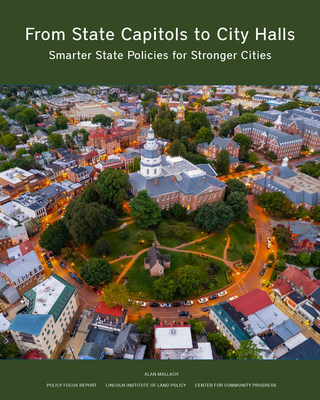Subjects: SVY, LEG, ENP
Cities Can't Thrive Without Smarter State Policy: New Report
CAMBRIDGE, Mass., Feb. 8, 2022 /PRNewswire/ -- American cities need to pursue creative new strategies as they rebuild from the COVID-19 pandemic and work to address longstanding social and economic inequities. Too often, however, cities face stiff headwinds in the form of state laws and policies that hinder their efforts to build healthy neighborhoods, provide high-quality public services, and foster vibrant economies in which all residents have an opportunity to thrive, according to a new Policy Focus Report by Center for Community Progress Senior Fellow Alan Mallach from the Lincoln Institute of Land Policy and the Center for Community Progress.
With a massive infusion of funds from the American Rescue Plan into cities and states, advocates for urban revitalization have an unprecedented opportunity to engage with state policy makers in creating a more prosperous, equitable future, Mallach writes in the report, From State Capitols to City Halls: Smarter State Policies for Stronger Cities. "If there's one central message in this report, it's that states matter?and that those who care about the future of our cities need to direct far greater attention to them," he writes.
Based on a detailed analysis of the complex yet critical relationship between states and their cities, the report illustrates how state policies and practices affect the course of urban revitalization, from the ways cities raise revenues to the conditions under which they can finance redevelopment. The report provides a rich picture of how state laws and practices can help or hinder equitable urban revitalization, drawing upon examples and strategies from across the country and highlighting the recurrent city?state tug-of-war that both must move beyond to work together for mutual benefit.
The report also breaks down what goes into successful revitalization, and how leaders can use legal and policy tools to bring about more equitable outcomes. Mallach recommends five underlying principles that should ground state policy related to urban revitalization: target areas of greatest need, think regionally, break down silos, support cities' own efforts, and build in equity and inclusivity.
"This report is thorough, relevant, and timely?and it provides a critical perspective on the importance of building capacity to ensure stronger alignment between state and local policy makers to improve equity and inclusion," said Sue Pechilio Polis, the director of health and wellness for the National League of Cities. "A detailed accounting of all of the ways state laws impact municipalities, this essential report will be a must read for state and local policy makers."
"As this Policy Focus Report details, state governments must be true partners with their cities in order to realize meaningful, equitable revitalization across the board," said Jessie Grogan, associate director of reduced poverty and spatial inequality at the Lincoln Institute. "By deliberately incorporating equity into economic growth and community work across locations and sectors, leaders at every level can foster truly progressive change."
From State Capitols to City Halls offers specific state policy directions to help local governments build fiscal and service delivery capacity, foster a robust housing market, stimulate a competitive economy, cultivate healthy neighborhoods and quality of life, and build human capital, all with the goal of bringing about a more sustainable, inclusive revival in American cities and towns. The report's recommendations offer a practical roadmap to help state policy makers take a fresh look at their own laws and further more effective advocacy for substantive change by local officials and non-governmental actors.
"We all deserve access to stable jobs, affordable housing, and green spaces, but unfortunately our systems aren't built to guarantee that for future and even current generations," said Massachusetts State Senator Eric P. Lesser, who chairs the Gateway Cities Caucus and the Economic Development Committee. "This report takes a thoughtful look at how we as policy makers can have a direct impact on building inclusive cities for all. From State Capitols to City Halls: Smarter State Policies for Stronger Cities provides real tools to support our communities, break down policies that breed inequality, and give everyone a fair shot at a high quality of life."
While successful strategies will vary from state to state, Mallach stresses that all policy makers must remember that every state is fundamental to its cities' futures as places of equity and inclusion. "In the final analysis," he notes, "states play a central, even essential, role in making revitalization possible?or, conversely, frustrating local revitalization efforts. This report should encourage public officials and advocates for change to make states more supportive, engaged partners with local governments and other stakeholders in their efforts to make our cities stronger, healthier places for all."
To read From State Capitols to City Halls: Smarter State Policies for Stronger Cities by Alan Mallach, visit: https://www.lincolninst.edu/publications/policy-focus-reports/state-capitols-city-halls
The Lincoln Institute of Land Policy seeks to improve quality of life through the effective use, taxation, and stewardship of land. A nonprofit private operating foundation whose origins date to 1946, the Lincoln Institute researches and recommends creative approaches to land as a solution to economic, social, and environmental challenges. Through education, training, publications, and events, we integrate theory and practice to inform public policy decisions worldwide.
Founded in 2010, the Center for Community Progress is the national leader for building strong, equitable communities where vacant, abandoned, and deteriorated properties are transformed into assets for neighbors and neighborhoods. Today, Community Progress has effected change in more than 48 states and seven countries through leadership education and collaborative systems, policy, and practice reforms. Simply, we work to transform "Vacant Spaces into Vibrant Places."
SOURCE Lincoln Institute of Land Policy
These press releases may also interest you
|
News published on and distributed by:




